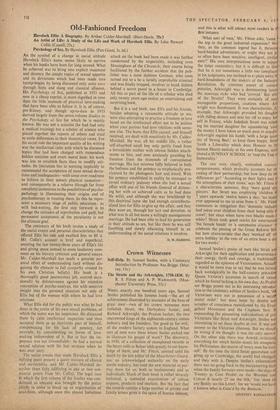Old-Fashioned Freedom
Havelock Ellis: A Biography. By Arthur Calder-Marshall. (Hart-Davis, 30s.) An Artist of Life: A Study of the Life and Work of Havelock Ellis. By John Stewart Collis. (Cassell, 25s.) Psychology of Sex. By Havelock Ellis. (Pan Giant, 3s. 6d.) As the symbol of a change in social attitude Havelock Ellis's name seems likely to survive when his books have been for long unread. What he achieved was to bring into explicit statement and decency the simple topics of sexual appetite and its deviations which had been made into turnip-bogies by being discussed only sotto voce through hints and slang and classical allusion. His Psychology of Sex, published in 1933 and now in a cheap reprint, is more dignified in tone than the little manuals of practical love-making that have been able to follow it. It is, of course, pre-Kinsey, and though up-to-date in 1933 derived largely from the seven-volume Studies in the Psychology of Sex for which he is mainly known. He was not a scientist (he had had only a medical training) but a scholar of science who pieced together the reports of others and tried to settle differences in their theoretical views. For his social role the important quality of his writing was the intellectual calm with which he discussed topics that had been charged with tremendous hidden emotion and overt moral heat; his work was less to establish facts than to modify atti- tudes. Its limitation lies in seeming implicitly to recommend the acceptance of most sexual devia- tions and inadequacies—with some over-readiness to believe in their inborn physical causation— and consequently in a relative (though far from complete) inattention to the possibilities of psycho- pathology in illuminating their origins and of psychotherapy in treating them. In this he repre- sents a necessary stage of public education: as with bed-wetting, the first step forward is to change the attitudes of reprobation and guilt, but permanent acceptance of the peculiarity is not the ultimate goal.
The centenary of his birth invites a study of the social events and personal characteristics that offered Ellis his role and enabled him to fill it. Mr. Collis's account is brief and superficial, omitting the last twenty-three years of Ellis's life and giving space instead to some laudatory com- ment on his literary criticism and general essays. Mr. Calder-Marshall has made a genuine per- sonal effort of understanding (and without dis- guising the obstacle to full sympathy created by his own Christian beliefs). His book is a thoroughly good journeynian job, marred occa- sionally by defensiveness against his mistaken conception of psycho-analysis, but with sensitive insight into the personal situation not only of Ellis but of the woman with whom he had love relations.
What Ellis did for the public was what he had done in the realm of his own sexual problems, of which the worst was his impotence. He distanced them by calm intellectual inspection and then accepted them as an inevitable part of himself, compensating for his 'lack of potency, for example, by concentrating on forms of love- making independent of it, But in fact the im- potence was not irremediable: he had a normal sexual relation with his last mistress when he was over sixty. The social events that made Havelock Ellis a rallying point present a queer mixture of chance and inevitability, and Mr. Calder-Marshall de- scribes them fully (differing in one or two sub- stantial points from Mr. Collis). The legal case, in which the first volume of the Studies was con- demned as obscene was brought by the police Chiefly in order to break up an organisation of anarchists, although once this almost fortuitous attack on the book had been made it was further condemned by the respectable, including even Massingham of the Chronicle, their course being facilitated by the further accident that the pub- lisher was a most dubious German, who soon turned out to a be a luridly improbable criminal and was finally trapped, revolver in hand, hidden behind a secret panel in a house in Cambridge. All this as part of the life of a scholar who died only twenty years ago makes an entertaining and surprising book.
But it is a sad book, too. Ellis and his friends, besides adopting a reasonable attitude to sex, were also attempting to practise a freedom in love based on the intellectual effort not to be jealous when your partner had love relations with some- one else. The hurts that Ellis caused, and himself received, are dealt with sensitively by Mr. Calder- Marshall. He was, all his middle life, a rather self-absorbed• small boy only partly freed from a formidable mother with intense hidden attach- ments to him, and now anxiously guarding his freedom from the trammels of conventional marriage. His last mistress fully believed in both the holiness and the potency so emphatically pro- claimed by the photogenic hair and beard. With his potency established in reality he managed to reveal ordinary jealousy when she had a sexual affair with one of his friends (instead of distanc- ing her with an achieved calm as he had done his wife), and although she was bewildered by this doctrinal lapse she had enough unintellectu- alised love for Ellis to give up the affair, and they then went on, through her tact and devotion, to what was in all but name a willingly monogamous marriage. He had been able to lead his generation in their attitude to sex, but like them he was still fumbling and slowly educating himself in an understanding of the social relations it involves.
D. W. HARDING






































 Previous page
Previous page